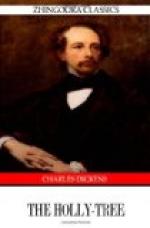So he takes Master Harry in his hand, and Boots leads the way with the candle, and they come to that other bedroom, where the elderly lady is seated by the bed, and poor little Mrs. Harry Walmers, Junior, is fast asleep. There the father lifts the child up to the pillow, and he lays his little face down for an instant by the little warm face of poor unconscious little Mrs. Harry Walmers, Junior, and gently draws it to him,—a sight so touching to the chambermaids who are peeping through the door, that one of them calls out, “It’s a shame to part ’em!” But this chambermaid was always, as Boots informs me, a soft-hearted one. Not that there was any harm in that girl. Far from it.
Finally, Boots says, that’s all about it. Mr. Walmers drove away in the chaise, having hold of Master Harry’s hand. The elderly lady and Mrs. Harry Walmers, Junior, that was never to be (she married a Captain long afterwards, and died in India), went off next day. In conclusion, Boots put it to me whether I hold with him in two opinions: firstly, that there are not many couples on their way to be married who are half as innocent of guile as those two children; secondly, that it would be a jolly good thing for a great many couples on their way to be married, if they could only be stopped in time, and brought back separately.
THIRD BRANCH—THE BILL
I had been snowed up a whole week. The time had hung so lightly on my hands, that I should have been in great doubt of the fact but for a piece of documentary evidence that lay upon my table.
The road had been dug out of the snow on the previous day, and the document in question was my bill. It testified emphatically to my having eaten and drunk, and warmed myself, and slept among the sheltering branches of the Holly-Tree, seven days and nights.
I had yesterday allowed the road twenty-four hours to improve itself, finding that I required that additional margin of time for the completion of my task. I had ordered my Bill to be upon the table, and a chaise to be at the door, “at eight o’clock to-morrow evening.” It was eight o’clock to-morrow evening when I buckled up my travelling writing-desk in its leather case, paid my Bill, and got on my warm coats and wrappers. Of course, no time now remained for my travelling on to add a frozen tear to the icicles which were doubtless hanging plentifully about the farmhouse where I had first seen Angela. What I had to do was to get across to Liverpool by the shortest open road, there to meet my heavy baggage and embark. It was quite enough to do, and I had not an hour too much time to do it in.




